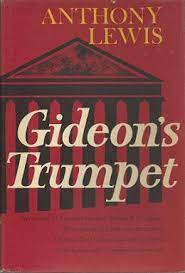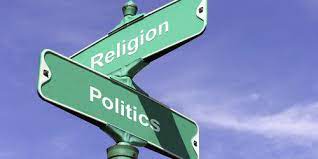Tag Archives: Supreme Court.
Gideon’s Trumpet. 2022 best

For this assignment we will focus on Gideon’s Trumpet. Please watch the video: https://www.youtube.com/watch?v=20JiDaH-2A4 You are to complete 4 of the following essays. Your paper should be no less than three pages.
Gideon’s Trumpet.
Please watch the video: Gideon’s Trumpet https://www.youtube.com/watch?v=20JiDaH-2A4 You are to complete 4 of the following essays. Your paper should be no less than three pages. Do not write the questions on your paper. 1.The U.S. Supreme Court has held that the Sixth Amendment right to counsel only applies at certain stages. What is the buzzword/phrase that determines whether or not the right applies at a given stage? Why has the Court set this standard? Provide some examples when the right does and does not attach. How did this apply in Gideon?
Gideon’s Trumpet.
2. The right to a speedy trial is central to the American justice system, yet difficult to define. Using the information from the text, attempt to define/outline the right to a speedy trial. Why is this right so important? Why might a defendant chose to waive this right? 3. What were the “special circumstances” that Betts v. Brady (1942) stated were required before the court would assign counsel to represent a defendant? Did Gideon fit any of those special circumstances? 4. The voir dire process is yet another aspect of the criminal justice system deemed central to the concept of justice. Why, then are peremptory challenges allowed?
Gideon’s Trumpet.
Explain why an attorney may or may not use a peremptory challenge. Explain the process of challenging a peremptory challenge. Why might this process be difficult in and of itself? 5. There are five accepted purposes of punishment. List, define, and explain the basic premise behind them. 6. Explain the rights granted in the Gideon v. Wainwright (1963) case. What benefits and concerns arise from this decision? https://youtu.be/20JiDaH-2A4
Additional Files
Religion law and politics 2022 Best

This paper explores religion law in America. In 1952, Congress passed a law dictating that the President would sign a declaration each year naming the first Thursday in May a National Day of Prayer.
Religion law and politics
RELIGION LAW AND POLITICS IN AMERICA. Please answer all three of the following questions. RELIGIOUS ESTABLISHMENT: In 1952, Congress passed a law dictating that the President would sign a declaration each year naming the first Thursday in May a National Day of Prayer. Though such a practice was not new in 1952 and dates back to the beginnings of the country, it has faced legal challenge including an unsuccessful appellate court challenge in 2011. President Biden declared May 6, 2021 such a day this year: https://www.whitehouse.gov/briefing-room/presidential-actions/2021/05/05/a-proclamation-on-national-day-of-prayer/ (Links to an external site.).
Religion law and politics
How might such a practice be justified in a nation with a separation between church and state? Do you think it is constitutional? Why or why not? What does this practice tell us about the relationship between religion and government in the United States? Mention at least two course readings or court cases in your answer. RELIGIOUS FREEDOM: The Governor of Connecticut recently signed a bill eliminating the religious exemption for mandatory school vaccinations: https://www.courant.com/politics/hc-pol-vaccines-exemption-connecticut-vote-20210427-lzql55kx7vep3pohq4y2ad2e3i-story.html (Links to an external site.)
Religion law and politics
Such a decision is likely to lead to court challenges and may end up before the Supreme Court. If it does, the primary issue will be whether or not religious freedom is being violated here or whether public health concerns should outweigh religious freedom concerns. How do you think the Supreme Court would or should rule? Why? What does this case study tell us about the relationship between religion and government in the United States? Mention at least two course readings or court cases in your answer. What reading from the course has stuck with you the most and why?
Religion law and politics
Your choice can be a reading that angered you, that taught you something you didn’t know, that affirmed something you believe, or that illuminated a different perspective. Each of these questions are questions that could be answered in a couple sentences or in a book length manuscript. Keep the time limitation of the exam in mind (2 hours). Strong essays should also have a strong thesis. I do not care what your argument is (i.e. there isn’t necessarily a right answer — there are many possible ways to answer these questions). https://youtu.be/RQcL6AFbWsY
Religion law and politics
What matters is whether you 1. support your argument with evidence, 2. organize your essay well, and 3. demonstrate that you have been doing class readings, engaging in class discussions, and apply those readings and discussions to the prompt. Questions 1 and 2 ask a series of questions and you don’t necessarily have to answer all of them. I’m mostly interested in you using the prompt as an opportunity to show me your thinking and application of the class readings and concepts. Question 3 will be shorter than the others but should still include some specifics from the readings to explain why you picked that reading and to engage with some of the ideas within it.






